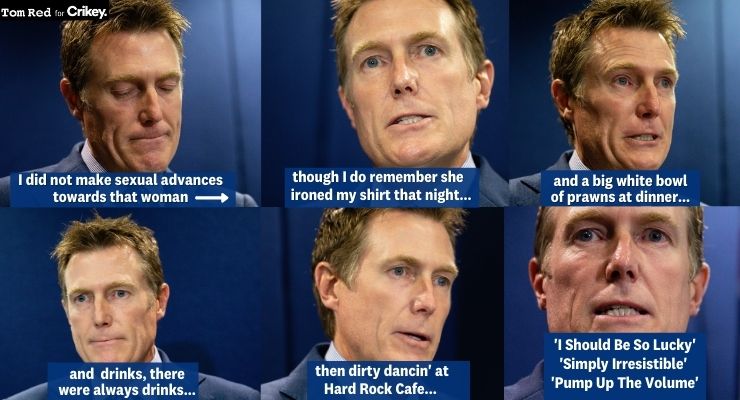
If I were to resign and that set a new standard, there wouldn’t be much need for an attorney-general anyway because there would be no rule of law left to protect in this country.
Christian Porter
Christian Porter, in strongly denying allegations of a 1988 rape, is the last figure in this government who can seriously rely on the rule of law in his defence. His actions as attorney-general have trashed it.
Porter’s actions in his vexatious prosecution of Witness K and Bernard Collaery — a prosecution motivated by a desire to punish those who revealed the Howard government’s shameful spying on Timor-Leste to help political donor Woodside — have been a complete abrogation of the rule of law. Porter has sought to keep the prosecution secret, in blatant disregard for the fundamental rule of law tenet of transparency, with the aim of covering up the actions of John Howard, Alexander Downer and DFAT and ASIS officials.
Porter has a penchant for secret trials: he oversaw the secret prosecution and imprisonment of another former intelligence officer, now to be the subject of an investigation by the Independent National Security Legislation Monitor.
Porter and his lawyers have also repeatedly intervened in the prosecution of Collaery to delay and drag out the case, leading to three separate judges criticising the conduct of the Commonwealth, the most recent in February.
His conduct as attorney-general in this case has made a total farce of the concept of the Commonwealth as “model litigant”, which includes “dealing with claims promptly and not causing unnecessary delay in the handling of claims and litigation”.
Christian Porter as attorney-general is explicitly responsible for the Commonwealth conducting itself as a model litigant, and he has abrogated that responsibility in the prosecution of Bernard Collaery.
Porter has also repeatedly and extensively engaged in the stacking of an important court, the Administrative Appeals Tribunal, with political affiliates and party mates, far beyond the level of partisan appointments by previous governments of both sides to that body. So great was the stacking that a 2019 review commissioned by the government itself criticised the large number of appointments by people with no legal background. The stacking has continued since then.
Porter also designed the Morrison government’s ridiculous anti-corruption body, which would allow crooked ministers to control how they were investigated and, crucially, would treat some public servants — law enforcement officials like Australian Federal Police staff — completely differently to other public servants and, especially, ministerial staff and ministers themselves, in complete disregard for the tenet of equality before the law.
Does Porter even understand the basic idea of the rule of law? Yesterday he claimed any inquiry “would be the first time in Australian history that a public figure or anyone effectively is put on trial in circumstances where they would be required to disprove something that didn’t happen 33 years ago”.
A number of commentators, and some sympathetic press gallery journalists, have parroted this claim.
But it is a clear misrepresentation of how any inquiry would be conducted, and perhaps a pre-emptive attempt to discredit any such inquiry, when very likely it would be conducted by an eminent legal figure, carried out in private, with legal representation, procedural fairness and a focus on testing the allegations, rather than placing any onus on Porter to “disprove” anything.
But of course Porter is a lawyer — the first law officer in the land, no less — and thus knows that perfectly well. It is absurd to think Porter did not deliberately misrepresent the idea of an inquiry. The first law officer lying about the law isn’t consistent with the rule of law, either.
Porter’s record as attorney-general is one of trashing the rule of law in order to look after the interests of the Liberal Party and of the government. The biggest threat to the continuation of the rule of law in Australia isn’t an inquiry into allegations against Porter — it’s Porter’s own conduct that has given the green light to secret trials, partisan prosecutions, rank nepotism, stacked courts and failed integrity bodies.








Crikey encourages robust conversations on our website. However, we’re a small team, so sometimes we have to reluctantly turn comments off due to legal risk. Thanks for your understanding and in the meantime, have a read of our moderation guidelines.